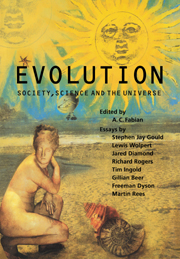Book contents
- Frontmatter
- Contents
- Introduction
- 1 On Transmuting Boyle's Law to Darwin's Revolution
- 2 The Evolution of Cellular Development
- 3 The Evolution of Guns and Germs
- 4 The Evolution of London
- 5 The Evolution of Society
- 6 The Evolution of the Novel
- 7 The Evolution of Science
- 8 The Evolution of the Universe
- Notes on Contributors
- Acknowledgements
- Index
Introduction
Published online by Cambridge University Press: 25 January 2010
- Frontmatter
- Contents
- Introduction
- 1 On Transmuting Boyle's Law to Darwin's Revolution
- 2 The Evolution of Cellular Development
- 3 The Evolution of Guns and Germs
- 4 The Evolution of London
- 5 The Evolution of Society
- 6 The Evolution of the Novel
- 7 The Evolution of Science
- 8 The Evolution of the Universe
- Notes on Contributors
- Acknowledgements
- Index
Summary
The concept of evolution means different things to different people. To a biologist it simply means genetic evolution, whereas in many other disciplines it can mean change, or unfolding, with time – sometimes with an implicit gradualness to distinguish it from revolution.
This collection of essays is the result of asking eight well-known communicators from separate disciplines to discuss evolution. It will be seen that most of them tell us how the topic has arrived where it has: the Darwinian concept of evolution itself from Stephen Jay Gould; cells and the embryo from Lewis Wolpert; the current human political divide (with a very broad brush) from Jared Diamond; society from Tim Ingold; the universe from Martin Rees; the scientific enterprise from Freeman Dyson; Richard Rogers on the evolution of cities concentrates on the current state of London and Gillian Beer considers whether novels have evolved at all and then tells us how the concept of evolution has permeated through fiction.
The essays were originally given as the Tenth Darwin College Lecture Series in early 1995. These Series have become an institution for some in Cambridge and are open to, and well attended by, the public as well as members of the College and University. The Lectures are intended to be interdisciplinary and to that end we select for each Series a group of well-known communicators, mostly from the academic world, and ask them to talk on a chosen theme. We have now had Origins, the Fragile Environment, Predictions, Communicating, Intelligence, Catastrophes, Colour and now Evolution. A greater appreciation of the overall result can best be obtained by looking at more than one volume.
- Type
- Chapter
- Information
- EvolutionSociety, Science and the Universe, pp. 1 - 3Publisher: Cambridge University PressPrint publication year: 1998
- 9
- Cited by

